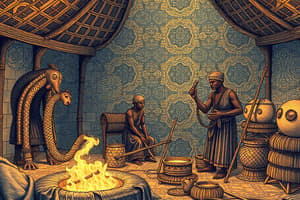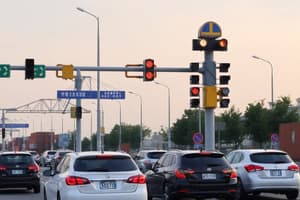Podcast
Questions and Answers
What is a potential disadvantage of relying solely on oral tradition to preserve history?
What is a potential disadvantage of relying solely on oral tradition to preserve history?
- Oral tradition promotes biased storytelling and exaggerations.
- Oral tradition makes it difficult to pass down information over long distances.
- Oral tradition limits the number of people who can learn about history.
- Oral tradition is unreliable and prone to inaccuracies. (correct)
What evidence suggests that Mansa Musa was both a wealthy and religious figure?
What evidence suggests that Mansa Musa was both a wealthy and religious figure?
- He embarked on a grand pilgrimage to Mecca, showcasing his wealth and devotion to Islam. (correct)
- He built numerous mosques and universities in Mali, demonstrating his wealth and commitment to education.
- He was a patron of the arts and sciences, demonstrating his cultural sophistication and wealth.
- He maintained a large army and treasury, demonstrating his power and resources.
What role did camels play in the trans-Saharan trade?
What role did camels play in the trans-Saharan trade?
- Camels provided a source of trade goods, as their wool and milk were valuable commodities.
- Camels provided a means of transportation for merchants, enabling them to carry heavy loads across vast distances. (correct)
- Camels facilitated communication between traders, as they could cover long distances quickly.
- Camels provided food and milk for traders, sustaining them during long journeys.
Why were oases in the Sahara important for traders?
Why were oases in the Sahara important for traders?
Which of the following is NOT a major geographic feature bordering the Sahara Desert?
Which of the following is NOT a major geographic feature bordering the Sahara Desert?
What does the term 'desertification' describe?
What does the term 'desertification' describe?
Why was salt so valuable in the trans-Saharan trade?
Why was salt so valuable in the trans-Saharan trade?
What contributed to the spread of Islam across the Sahara?
What contributed to the spread of Islam across the Sahara?
How did the conversion of West African rulers to Islam influence trade?
How did the conversion of West African rulers to Islam influence trade?
What architectural feature demonstrates the adaptation of traditional mosque designs to the African climate?
What architectural feature demonstrates the adaptation of traditional mosque designs to the African climate?
What was the primary reason for the decline of the Nok civilization?
What was the primary reason for the decline of the Nok civilization?
How did the king of Ghana ensure the high value of gold?
How did the king of Ghana ensure the high value of gold?
Why were the traders of Ghana considered ideal middlemen?
Why were the traders of Ghana considered ideal middlemen?
Which of the following statements accurately describes the importance of smelting to the Nok people?
Which of the following statements accurately describes the importance of smelting to the Nok people?
What is the main role of griots in early African civilizations?
What is the main role of griots in early African civilizations?
What made Koumbi-Saleh, the capital of Ghana, an ideal location?
What made Koumbi-Saleh, the capital of Ghana, an ideal location?
How did Mansa Musa gain his immense wealth?
How did Mansa Musa gain his immense wealth?
What significant impact did trade have on both the Ghana and Mali empires?
What significant impact did trade have on both the Ghana and Mali empires?
Flashcards
Nok people
Nok people
Among the first in Africa to make iron tools.
Iron Age
Iron Age
A period marked by the widespread use of iron tools and weapons.
Terra cotta
Terra cotta
Fire-baked clay used to make sculptures, often of humans.
Smelting
Smelting
Signup and view all the flashcards
Ghana's capital location
Ghana's capital location
Signup and view all the flashcards
Middlemen in trade
Middlemen in trade
Signup and view all the flashcards
Mansa Musa's wealth
Mansa Musa's wealth
Signup and view all the flashcards
Griots
Griots
Signup and view all the flashcards
Captivate
Captivate
Signup and view all the flashcards
Oral Tradition
Oral Tradition
Signup and view all the flashcards
Mansa Musa
Mansa Musa
Signup and view all the flashcards
Trans-Saharan Trade
Trans-Saharan Trade
Signup and view all the flashcards
Desertification
Desertification
Signup and view all the flashcards
Caravan
Caravan
Signup and view all the flashcards
Salt's Value
Salt's Value
Signup and view all the flashcards
Berber Merchants
Berber Merchants
Signup and view all the flashcards
Savannah
Savannah
Signup and view all the flashcards
Islamic Adaptation
Islamic Adaptation
Signup and view all the flashcards
Study Notes
Nok People
- First African people to create iron tools
- Iron age tools revolutionized tools and weapons
Terracotta
- Fire-baked clay used to sculpt human figures
Iron Age
- Era marked by widespread use of superior iron tools and weapons
Nok Decline
- Deforestation and soil overuse damaged ecosystem and made soil infertile
Ghana's Koumbi-Saleh
- Strategically located near salt sources and gold mines
Middlemen
- Individuals who buy and resell goods
- Ghana's traders profited from middleman activities
Ghana's Economy
- King collected taxes on salt and other goods
Ghana's Gold Control
- King owned all gold nuggets, controlled gold dust trade
- Scarcity of gold maintained high prices
Islam's Spread in Ghana
- Almoravids conquered Koumbi-Saleh, introducing Islam
Sundiata Keita
- Founder of the Mali Empire
- Promoted peace, justice, and tolerance
Mansa Musa's Wealth
- Collected tribute from kings and taxes from merchants
- Accumulated vast gold wealth
Mansa Musa's Contributions
- Supported arts, learning, and Islam
- Promoted Timbuktu as a center of Islamic learning
Timbuktu's Significance
- Became a prominent religious center in the 1500s
Trade in Ghana and Mali
- Trade brought wealth, goods, and economic growth
Griots
- Preserved family histories and stories through oral tradition
Oral Tradition
- Oral storytelling preserved African history
Griot Duties
- Performed stories and tales at public gatherings
Oral Tradition's Advantages and Disadvantages
- Potential for inaccuracies or loss of information due to generational transmission
- Unique way to pass down information
Mansa Musa's Wealth and Religious Devotion (Document 1)
- Mansa Musa's documented wealth contributed to knowledge of Mali
Al-Umari's Account of Mansa Musa (Document 1)
- Reliability of account on Mansa Musa's Cairo visit is questionable
Mansa Musa's Importance (Document 2)
- Stories of Mansa Musa's wealth drew interest in West Africa
- Represented importance on map
Mansa Musa's Holding on Map (Document 2)
- Likely depicted holding gold signifying his wealth
Roles Depicted in Map (Document 2)
- Camel rider likely a merchant
- Wealthy figure on the right
Northern Africa's Mountain Range
- Atlas Mountains
Sahara Desert
- Largest desert in Africa, spanning over 3000 miles
- Bordering bodies of water: Red Sea (East) and Atlantic Ocean (West)
Sahara Climate
- Hot and dry climate, warm winters
Savannah
- Lush tropical grasslands formed after sea-level change
Desertification
- Process of land becoming arid due to water loss and soil dryness
Trans-Saharan Trade
- Trade routes across the Sahara, developed with the use of camels
Camels' Impact on Trade
- Enabled transportation of heavy loads over long distances
- Crucial to trans-Saharan trade
Caravans
- Groups of merchants traveling together for safety and protection
Oases' Role
- Provided water and trading locations for caravans
Lake Chad Route
- Offered alternative trade route from Gao to Alexandria, avoiding mountainous terrains
Trans-Saharan Trade Commodities
- Gold (Africa) traded for silk (China) and spices (India)
- Salt valued due to rarity and difficulty in preservation
- Scarcity of salt increased demand and price
Slave Use in Trade
- Used for mining gold, salt, and labor
- Conditions were harsh in North African trade
Islam's Spread Across Sahara
- Primarily spread by Berber merchants
West African Conversion to Islam
- Conversions began in the 1000s among West African rulers
Transferred Ideas
- Spread of Islam and its religious, cultural values
Islam as a Trade Advantage
- Shared religion and cultural norms facilitated trade
- Made trade more profitable and efficient
Traditional Mosque Adaptations
- Adaptations fit local African climates
Studying That Suits You
Use AI to generate personalized quizzes and flashcards to suit your learning preferences.



